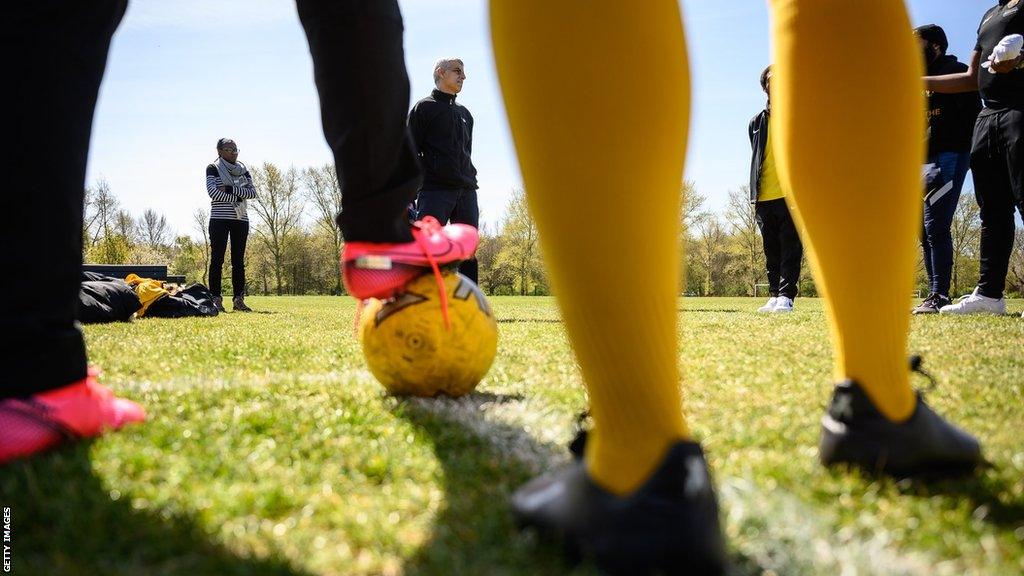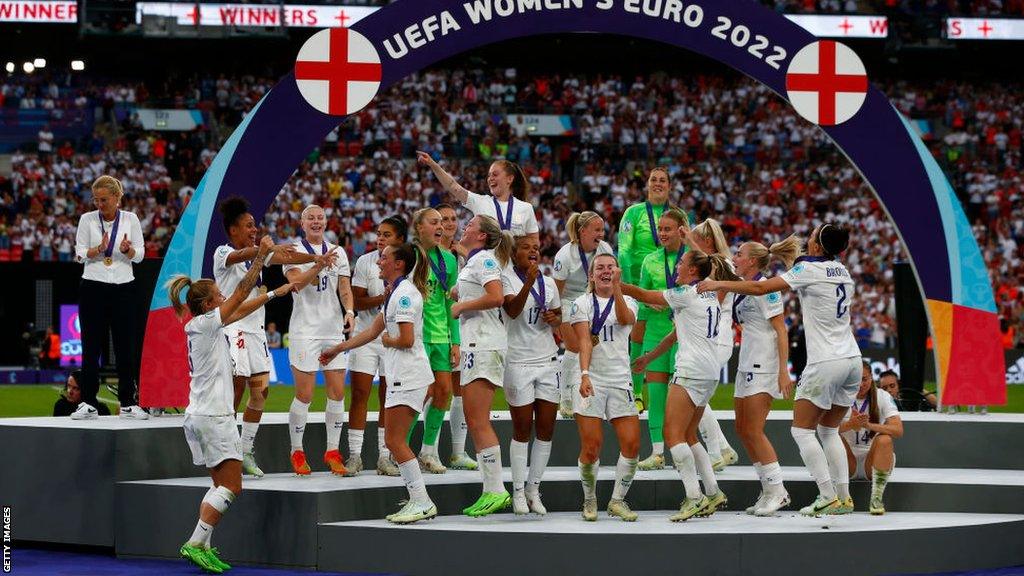UK sport strategy: Government plans to get extra 3.5m active by 2030
- Published

The initiative aims to increase sport participation in 2.5 million adults and over 1 million children
The government has launched a new initiative with the target of getting an additional 3.5 million people physically active by 2030.
Former England rugby union player Ugo Monye is part of a new taskforce appointed to drive the strategy.
It is part of the government's new sport strategy which "sets out a blueprint" to improve the nation's health and fitness.
The new initiative follows a decline in activity rates.
Figures from the Sport England Active Lives Survey indicate that 25% of adults are currently deemed to be inactive in England, with over 11 million doing less than 30 minutes of activity in total a week.
And statistics indicate that 53% of children and young people are not meeting the guidance of taking part in at least 60 minutes of activity a day.
As well as increasing participation in sport, the strategy aims to:
Set the vision for the future of the sector in the country
Improve how integrity issues, such as misconduct, doping and corruption are dealt with by sporting bodies
Ensure the sector moves towards a more sustainable future, both financially and environmentally
Continue to support UK Sport, governing bodies and host cities to bid and successfully host major sporting events
'Targets for all ages and backgrounds'
Figures released this month show 4,000 hours of physical education were lost in state-funded schools, and "should be a matter of immediate national concern", according to the Youth Sport Trust.
The new participation targets include over 2.5 million adults and over 1 million children and are intended to reach people of all ages and backgrounds, and meet the UK chief medical officers' guidance that adults should aim to carry out at least 150 minutes of moderate intensity activity a week and children should carry out at least 60 minutes of physical activity a day.
"As a former international player and dad to young children, I know the importance of instilling the benefits of sport and physical activity," said Monye, who earned 14 caps for England before his retirement in 2015 and will be an independent co-chair of the taskforce.
"It is clear that a major effort is needed to get Britain moving and boost our national health. I'm determined to use my experience and drive forward this ambitious strategy."
It is the first sport strategy to be published since 2015, and follows the government's investment of almost £400 million in grassroots facilities.
This is alongside investment of over £600 million for school sport and PE over the next two years, with a focus on making inclusion equal for girls and boys.
That came after members of England's Euros-winning women's football squad - who recently finished runners-up at the World Cup - campaigned for all girls to have equal access at school, highlighting that only 63% of girls could play football in PE lessons, according to a Football Association (FA) campaign published last year.
"Our new taskforce, jointly led with Ugo Monye, will work across government and the sports industry to turn these ambitious targets into a reality, helping to break down barriers to help people enjoy the benefits of getting active," said culture secretary Lucy Frazer.
'Everyone participating in sport should feel safe'

England campaigned for all girls to have equal access to sport in school following their Euro 2022 victory
The strategy also sets out a vision for the sports sector, to improve how integrity issues such as misconduct, doping and corruption are dealt with by sporting bodies, to making sport a "welcoming, inclusive and fair environment that participants and their parents or guardians can have confidence in".
The government will also call for evidence on how "current experiences of how issues and concerns in sport across the UK are dealt with in the sector, and how these could be strengthened".
"It is vital that everyone participating in sport feels safe and secure. We want to ensure that we have the strongest possible systems for addressing sport integrity issues and that we remain at the forefront of global efforts around fairness and inclusion in sport," said sports minister Stuart Andrew.
The initiative also seeks to ensure that sport moves towards a more sustainable future, both financially and environmentally, while continuing to work with UK Sport, host cities and sporting bodies to bid for, and successfully host, major sporting events.
It follows the recent success of England hosting Uefa Women's Euro 2022, the Birmingham 2022 Commonwealth Games and the Rugby League World Cup.
The UK and Ireland are also bidding to host Euro 2028, with the government citing the hosting of big sporting events as being key to inspiring people in getting active.
Sport England chief executive Tim Hollingsworth welcomed the new strategy, including the "commitment to strengthening integrity in sport and the determination in particular to ensure welfare and safeguarding issues are dealt with and best practice promoted".
He added: "Some serious consideration of reform is vital; especially given the high-profile examples and challenges we have seen across multiple sports in recent years. Working through all the options must be a priority now if we are to ensure that sport is a safe and welcoming environment for all."